EC may reconsider patient information rules
- 27 December 2007
The European Commission is considering tabling legislation next year that would change the rules on the information that drug companies can provide to patients, according to the British Medical Journal.
The expectation is that there will be some relaxation of the rules which strictly control the information that drug companies can offer patients and restrict them to certain media such as patient information leaflets placed in drug packaging.
The internet has played a key role in disrupting the power of governments and the influence of consumer campaigners – who mostly favour stringent regulation – over the pharmaceutical industry.
In the US, where direct-to-consumer (DTC) advertising is permitted, websites have sprung up offering information to the public about branded drugs and the conditions they can be used to treat. Though the sites always carry notices indicating that they are for US consumers and patients, in effect, they are open to anyone in the world with an internet connection.
The BMJ quotes Christian Siebert, department head at the European Commission’s Directorate General for Enterprise and Industry, as saying that there is an "emerging consensus" from consultations conducted this year that change is needed.
It adds, however, that Siebert told a recent meeting of the European Parliament held to discuss the issue that "the ban on direct-to-consumer advertising should be maintained."
The EC and the European Parliament has been considering the question of a more permissive approach since 2001 when a proposal from the commission for a limited trial of DTC advertising was diluted and, finally, thrown out by the parliament.
BEUC, the European Consumers’ Organisation which represents 41 member organisations around the continent, issued a statement opposing moves to permit more direct communication from the pharmaceutical industry to patients.
Responding to points made at the meeting, BEUC director-general, Monique Goyens, said: “The inherent conflict of interest of pharmaceutical companies providing information directly to patients is so obvious that we cannot imagine any policy would allow it in Europe.
“Patients deserve information which is unbiased and of the highest possible quality and other more reliable sources… must be promoted.”
An opposing view came from Brian Ager, director-general of the European Pharmaceutical Industry Association, who told the meeting: “After so many years of debate there now seems to be widespread agreement that communication with European patients and the general public on health issues and prescription medicines should be improved with the objective of having better informed patients.”
He said the industry was ready to play its role in the provision of non-promotional high-quality information in order to be enabled to respond to citizens’ legitimate right to benefit from such information.
Links
BMJ: Drug companies expected to get more leeway in communicating with patients in Europe (Subscription may be needed)
Examples of US patient information sites:
Arimidex, a drug used for adjuvant treatment of breast cancer in certain groups of patients
Aricept, a drug that can help Alzheimer’s Disease patients
Links
European Pharmaceutical Industry Association




